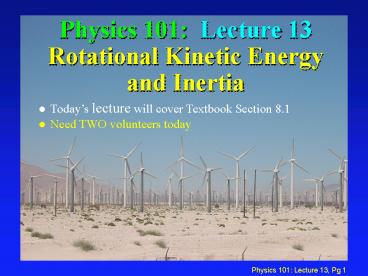Physics 101: Lecture 13 Rotational Kinetic Energy and Inertia - PowerPoint PPT Presentation
1 / 14
Title:
Physics 101: Lecture 13 Rotational Kinetic Energy and Inertia
Description:
For objects with finite number of masses, use I = S m r2. ... Energy is conserved but need to include rotational energy too Krot = I w2. 30 ... – PowerPoint PPT presentation
Number of Views:111
Avg rating:3.0/5.0
Title: Physics 101: Lecture 13 Rotational Kinetic Energy and Inertia
1
Physics 101 Lecture 13Rotational Kinetic
Energy and Inertia
- Todays lecture will cover Textbook Section 8.1
- Need TWO volunteers today
2
Linear and Angular
- Linear Angular
- Displacement x q
- Velocity v w
- Acceleration a a
- Inertia m
- KE ½ m v2
- N2L F ma
- Momentum p mv
Today!
Today!
07
3
Energy ACT
- When the bucket reaches the bottom, its potential
energy has decreased by an amount mgh. Where has
this energy gone? - A) Kinetic Energy of bucket
- B) Kinetic Energy of flywheel
- C) Both 1 and 2.
At bottom, bucket has zero velocity, energy must
be in flywheel!
11
4
Rotational Inertia, I
- Tells how much work is required to get object
spinning. Just like mass tells you how much
work is required to get object moving. - Ktran ½ m v2 Linear Motion
- Krot ½ I w2 Rotational Motion
- I S miri2 Rotational inertia
(units kg m2) - Note! Rotational Inertia depends on what you are
spinning about (basically the ri in the equation).
13
5
Rotational Inertia Table
- For objects with finite number of masses, use I
S m r2. For continuous objects, use table below.
33
6
Merry Go Round
Four kids (mass m) are riding on a (light)
merry-go-round rotating with angular velocity w3
rad/s. In case A the kids are near the center
(r1.5 m), in case B they are near the edge (r3
m). Compare the kinetic energy of the kids on the
two rides.
A) KA gt KB B) KA KB C) KA lt KB
- KE 4 ½ m v2
- 4 ½ m (w r)2 ½ I w2 Where
I 4 m r2 - Further mass is from axis of rotation, greater KE
it has.
17
7
Contest!
8
Inertia Rods
- Two batons have equal mass and length.
- Which will be easier to spin
- A) Mass on ends
- B) Same
- C) Mass in center
I S m r2 Further mass is from axis of
rotation, greater moment of inertia (harder to
spin)
21
9
Rolling Race (Hoop vs Cylinder)
- A hoop and a cylinder of equal mass roll down a
ramp with height h. Which has greater KE at
bottom? - A) Cylinder B) Hoop C) Same
- 29 21 50
24
10
Preflight Rolling Race (Hoop vs Cylinder)
- A hoop and a cylinder of equal mass roll down a
ramp with height h. Which gets to the bottom of
the ramp first? - A) Cylinder B) Hoop C) Same
- 45 22
34
race
Both objects start with the same potential
energy at the top of the ramp, so they must have
the same kinetic energy at the bottom of the
ramp. A has a smaller moment of inertia, it will
get to the bottom first b/c of its greater
acceleration.
27
11
Main Ideas
- Rotating objects have kinetic energy
- KE ½ I w2
- Moment of Inertia I S mr2
- Depends on Mass
- Depends on distances
- Depends on axis of rotation
- Energy is conserved but need to include
rotational energy too Krot ½ I w2
30
12
Massless Pulley Example
- Consider the two masses connected by a pulley as
shown. Use conservation of energy to calculate
the speed of the blocks after m2 has dropped a
distance h. Assume the pulley is massless.
Note Tension does positive work on 1 and
negative work on 2. Net work (on 1 and 2) by
tension is ZERO.
37
13
Massive Pulley Act
- Consider the two masses connected by a pulley as
shown. If the pulley is massive, after m2 drops a
distance h, the blocks will be moving - A) faster than
- B) the same speed as
- C) slower than
- if it was a massless pulley
Slower because some energy goes into spinning
pulley!
45
14
Summary
- Rotational Kinetic Energy Krot ½ I w2
- Rotational Inertia I S miri2
- Energy Still Conserved!
- Practice Problems Ch. 8 3, 5, 9
50

